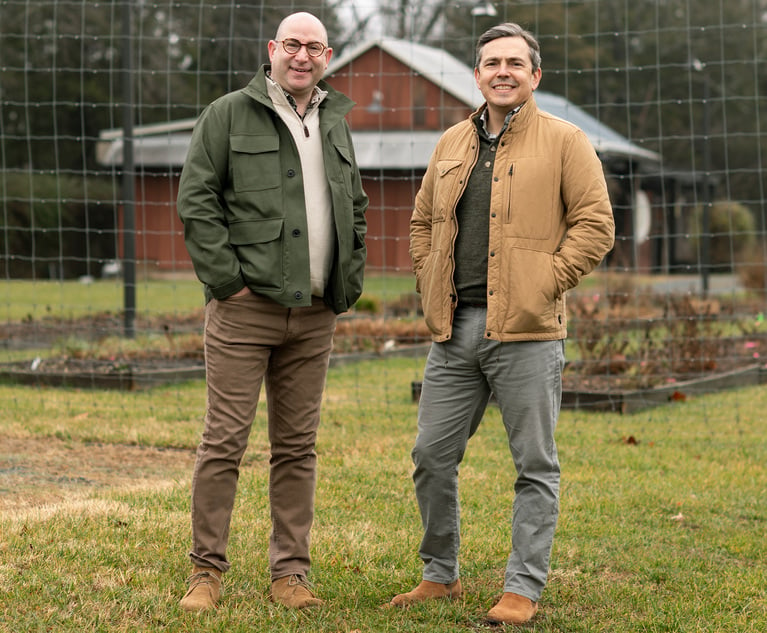 Curtis Lovelace waits for proceedings in his murder trial to begin Wednesday, March 8, 2017, at the Sangamon County Courthouse in Springfield, Ill. Lovelace, a former Adams County assistant state's attorney, is accused in the 2006 death of his first wife, Cory Lovelace. His first trial ended with a deadlocked jury. (Michael Kipley/The Quincy Herald-Whig via AP, Pool)
Curtis Lovelace waits for proceedings in his murder trial to begin Wednesday, March 8, 2017, at the Sangamon County Courthouse in Springfield, Ill. Lovelace, a former Adams County assistant state's attorney, is accused in the 2006 death of his first wife, Cory Lovelace. His first trial ended with a deadlocked jury. (Michael Kipley/The Quincy Herald-Whig via AP, Pool)Daily Dicta: Lawyer Acquitted of Murder Sues for Malicious Prosecution—But Must Judge Recuse?
'The fact that a relative works at a law firm representing a party is not enough. There would need to be some aggravating circumstance, and there is none here,' the Seventh Circuit panel held.
February 26, 2020 at 12:07 AM
6 minute read
"Golden boy."
That's how People Magazine described Quincy, Illinois lawyer Curtis Lovelace—a former college football star, school board president and state prosecutor.
That is, until he was charged in 2014 with murdering his wife Cory, who died unexpectedly eight years earlier. Prosecutors belatedly claimed Lovelace smothered his 38-year-old spouse with a pillow. He said she died of natural causes stemming from alcohol abuse and other health issues.
The first jury hung. On retrial—and after uncovering a trove of previously undisclosed exculpatory evidence—Lovelace was found not guilty in March of 2017.
 But that's not where the story ends. Lovelace and his three sons are now suing the City of Quincy, Adams County, Illinois and the county coroner's office in U.S. District Court for the Central District of Illinois for civil rights violations, claiming malicious prosecution.
But that's not where the story ends. Lovelace and his three sons are now suing the City of Quincy, Adams County, Illinois and the county coroner's office in U.S. District Court for the Central District of Illinois for civil rights violations, claiming malicious prosecution.
If they prevail, it could be a pricey hit for the local government. After all, Lovelace spent 21 months in jail and another nine months under house arrest, "awaiting trial for a crime that he did not commit," his lawyers wrote. "He lost his law practice and spent three years unable to earn a living… the emotional pain and suffering caused by this three-year ordeal, specifically by the ordeal of being charged with killing one's wife and the mother of one's children, has been substantial."
On Tuesday, the U.S. Court of Appeals for the Seventh Circuit issued a notable opinion—one with ramifications beyond Lovelace's case—after the defendants tried to force the trial court judge, U.S. District Judge Sue Myerscough, to recuse.
At issue: the judge's daughter, Lauren Myerscough‐Mueller, who works as an attorney with the University of Chicago's Exoneration Project.
Lovelace in his civil rights suit is represented by Loevy & Loevy, which funds the Exoneration Project—and I don't mean a modest annual donation. The firm issues the paychecks for Exoneration Project employees and donates the time of its lawyers, including the attorneys of record in this case, Jonathan Loevy and Tara Thompson, who also successfully defended Lovelace in his second criminal trial.
Is that too close for comfort?
"The fact that the judge's daughter works with the attorneys representing plaintiffs creates an appearance of partiality," counsel for the defendants from Ancel Glink and Schmiedeskamp, Robertson, Neu & Mitchell argued, noting that the Exoneration Project has only six clinical teachers, including Loevy, Thompson and the judge's daughter.
"It is reasonable to assume, given the small size and nature of the legal clinic, that Lauren Myerscough-Mueller, as a staff attorney, would be working very closely with Mr. Loevy and/or Ms. Thompson," they wrote. "The judge is and should be proud of her daughter's work. …However, if her daughter's employment is contingent on continued funding by plaintiff's counsel…impartiality can be questioned."
They added, "Based on this, a reasonable belief arises that those two lawyers and their clients will receive favorable treatment, even if Ms. Myerscough-Mueller does not appear in this case."
But the Seventh Circuit panel rejected their mandamus petition, ruling that recusal was unnecessary.
"To be sure, the ties between Loevy & Loevy and the Exoneration Project are close," wrote Judge David Hamilton, who was joined by Senior Judge Daniel Manion and Judge Michael Brennan.
But they noted that the judge's daughter "has never represented Lovelace and does not represent him now, even if she were deemed a salaried attorney at the firm that represents Lovelace. She has been screened from any involvement in cases before Judge Myerscough, including the Lovelace matter. These circumstances, without more, do not call for recusal."
They added, "The fact that a relative works at a law firm representing a party is not enough. There would need to be some aggravating circumstance, and there is none here."
The defendants argued that the judge also attended an annual fundraising dinner for the Illinois Innocence Project, where "exonerees" including Lovelace were recognized.
But the panel pointed out that Myerscough attended the dinner in a personal capacity with her daughter, who was working for the Innocence Project at the time. Nor was Myerscough then handling Lovelace's case—it was assigned to Judge Colin Bruce.
Bruce subsequently recused himself because Lovelace, who has launched his own criminal defense firm, was representing a defendant before him. At that point, Myerscough got the Lovelace case from Bruce—but she had no way of knowing that would happen when she attended the dinner.
"Here, defendants have pointed to nothing beyond the bare fact of Myerscough‐Mueller's employment that poses a risk of bias. The judge's benign attendance at the earlier Springfield dinner does not rise to that level of something extra," the Seventh Circuit panel held.
Motions for summary judgment are pending before Myerscough in Lovelace's civil rights suit.
Lovelace in his complaint doesn't specify the amount of damages he's seeking, but his lawyers offer a compelling narrative of injustice.
"This experience almost destroyed his family," they wrote. "It did destroy his personal finances, his law practice, and his reputation in the town he was born in, had lived in almost his entire life, and had served as a public official in various capacities. Curt and his family were ostracized from Quincy, and after his acquittal, Curt and his family had to leave town. Curt must start his life over as a 48-year-old man."
This content has been archived. It is available through our partners, LexisNexis® and Bloomberg Law.
To view this content, please continue to their sites.
Not a Lexis Subscriber?
Subscribe Now
Not a Bloomberg Law Subscriber?
Subscribe Now
NOT FOR REPRINT
© 2025 ALM Global, LLC, All Rights Reserved. Request academic re-use from www.copyright.com. All other uses, submit a request to [email protected]. For more information visit Asset & Logo Licensing.
You Might Like
View All
Litigation Leaders: Greenspoon Marder’s Beth-Ann Krimsky on What Makes Her Team ‘Prepared, Compassionate and Wicked Smart’

Why the Founders of IP Boutique Fisch Sigler Are Stepping Away From the Law and Starting an AI Venture
Trending Stories
Who Got The Work
Michael G. Bongiorno, Andrew Scott Dulberg and Elizabeth E. Driscoll from Wilmer Cutler Pickering Hale and Dorr have stepped in to represent Symbotic Inc., an A.I.-enabled technology platform that focuses on increasing supply chain efficiency, and other defendants in a pending shareholder derivative lawsuit. The case, filed Oct. 2 in Massachusetts District Court by the Brown Law Firm on behalf of Stephen Austen, accuses certain officers and directors of misleading investors in regard to Symbotic's potential for margin growth by failing to disclose that the company was not equipped to timely deploy its systems or manage expenses through project delays. The case, assigned to U.S. District Judge Nathaniel M. Gorton, is 1:24-cv-12522, Austen v. Cohen et al.
Who Got The Work
Edmund Polubinski and Marie Killmond of Davis Polk & Wardwell have entered appearances for data platform software development company MongoDB and other defendants in a pending shareholder derivative lawsuit. The action, filed Oct. 7 in New York Southern District Court by the Brown Law Firm, accuses the company's directors and/or officers of falsely expressing confidence in the company’s restructuring of its sales incentive plan and downplaying the severity of decreases in its upfront commitments. The case is 1:24-cv-07594, Roy v. Ittycheria et al.
Who Got The Work
Amy O. Bruchs and Kurt F. Ellison of Michael Best & Friedrich have entered appearances for Epic Systems Corp. in a pending employment discrimination lawsuit. The suit was filed Sept. 7 in Wisconsin Western District Court by Levine Eisberner LLC and Siri & Glimstad on behalf of a project manager who claims that he was wrongfully terminated after applying for a religious exemption to the defendant's COVID-19 vaccine mandate. The case, assigned to U.S. Magistrate Judge Anita Marie Boor, is 3:24-cv-00630, Secker, Nathan v. Epic Systems Corporation.
Who Got The Work
David X. Sullivan, Thomas J. Finn and Gregory A. Hall from McCarter & English have entered appearances for Sunrun Installation Services in a pending civil rights lawsuit. The complaint was filed Sept. 4 in Connecticut District Court by attorney Robert M. Berke on behalf of former employee George Edward Steins, who was arrested and charged with employing an unregistered home improvement salesperson. The complaint alleges that had Sunrun informed the Connecticut Department of Consumer Protection that the plaintiff's employment had ended in 2017 and that he no longer held Sunrun's home improvement contractor license, he would not have been hit with charges, which were dismissed in May 2024. The case, assigned to U.S. District Judge Jeffrey A. Meyer, is 3:24-cv-01423, Steins v. Sunrun, Inc. et al.
Who Got The Work
Greenberg Traurig shareholder Joshua L. Raskin has entered an appearance for boohoo.com UK Ltd. in a pending patent infringement lawsuit. The suit, filed Sept. 3 in Texas Eastern District Court by Rozier Hardt McDonough on behalf of Alto Dynamics, asserts five patents related to an online shopping platform. The case, assigned to U.S. District Judge Rodney Gilstrap, is 2:24-cv-00719, Alto Dynamics, LLC v. boohoo.com UK Limited.
Featured Firms
Law Offices of Gary Martin Hays & Associates, P.C.
(470) 294-1674
Law Offices of Mark E. Salomone
(857) 444-6468
Smith & Hassler
(713) 739-1250








